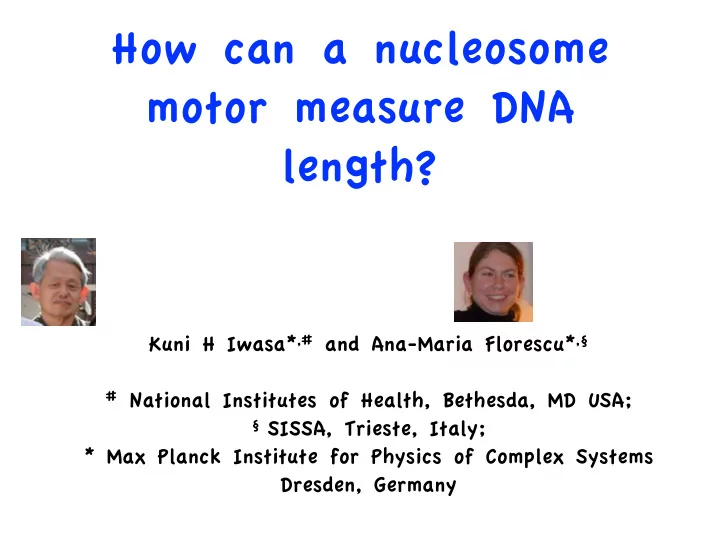

How can a nucleosome motor measure DNA length? Kuni H Iwasa* ,# and Ana-Maria Florescu* ,§ # National Institutes of Health, Bethesda, MD USA; § SISSA, Trieste, Italy; * Max Planck Institute for Physics of Complex Systems Dresden, Germany
acknowledgment For discussion and support of this work, we thank Frank Jülicher and Max Planck Institute for Physics of Complex Systems, where the major part of this work was done.
the question long short • A class of chromatin remodeling motors translocates the nucleosome to the center of DNA strand. • How does it sense the DNA length?
ACF and ISW1a Leschziner 2011
in vitro experiment long short unquenching Yang et al. 2006
unit steps Hwang et al 2014
the assumptions • The rate limiting step is DNA (un)binding, which depends on fluctuation of DNA. • interaction between the motor and the chain can be described by discrete steps. • the motor dimers have cooperative interaction between them
dominant mode of chain fluctuation k θ θ “breathing”* * Li, Bustamante, Widom 2000 approximated by a hinge. angular fluctuation the spring that holds DNA determines the amplitude of fluctuation in angle 1 2 k θ h ∆ θ 2 i ⇠ k B T length-independent
viscous drag on chain rotation Rotational diffusion coefficient is give by,* D r πη L 3 D r = ln L 2 r + δ 3 k B T r ✓ 2 r ◆ L δ ≈ − 0 . 7 + O L The Einstein relationship leads to the friction ζ r coefficient , ζ r ≈ πη L 3 1 3 ln( L/ 2 r ) − 0 . 7 * Tirado et al. 1984
rotational diffusion of nucleosome? Approximate the nucleosome with a sphere, L ζ n = 8 πη R 3 R and ◆ 3 ✓ R ζ n = 24 · [ln( L/ 2 r ) − 0 . 7] L ζ r . If L=40 nm, The mass of 1 MD leads to R ≈ 8 nm ζ n ∼ 0 . 3 ζ r ζ n However, this is an underestimation of because nucleosome is elongated in the direction it holds DNA.
fluctuation spectrum Consider pivoting motion. ζ dy ( t ) = − k y ( t ) + F ( t ) dt If random noise F(t) is ‘white,’ S y ( ω ) = 2 k B T 1 ( k/ ζ ) 2 + ω 2 · ζ with ζ r ≈ πη L 3 1 3 ln( L/ 2 r ) − 0 . 7
the model γ eigenvector B ound ⇌ U nbund γ B γ + µ ↑ ↓ µ ν = U γ A γ µ/ ν A dvanced rotation rate of the motor: γ µ ν A = γ 2 + ( γ + µ ) 2 + ( γ µ/ ν ) 2 p
alternative assignment long short γ U B γ ν µ γ µ A ν A = γ 2 + ( γ + µ ) 2 + ( γ µ/ ν ) 2 p
length dependence of tugging speed γ µ ν A = γ 2 + ( γ + µ ) 2 + ( γ µ/ ν ) 2 ν → ∞ p 0.6 0.5 0.4 γ ∼ (ln( L/ 2 r ) − 0 . 7) /L 3 smaller ν 0.3 0.2 0.1 1 2 3 4 5 chain length L µ = 1 � r = 0 . 1 long short
role of dimerization the two subunits share a binding site to avoid wasting energy* *as proposed by Leonard and Narlikar 2015 § § § same U U conf. A 8 configurations directions of transitions B B antisymmetric geometry
is a protein arm stiffer than DNA? assumed as if it is… is that true? DNA does not have to be more flexible if: • the arm is shorter than saturation length • its distribution is asymmetric with respect to DNA
sliding mechanism? sliding mechanism is not addressed here. addressed is how sliding is initiated. compatible with various sliding mechanisms, e.g. Ludwigsen et al 2013 Hota et al 2013
in vivo relevance ? Fudenberg & Mirny 2012 Ricci et al., 2015, Cell 160, 1145–1158
conclusions • A model for sensing the length of DNA strand is proposed. • Chain fluctuation can serve as a sensing mechanism for ACF. • Details need to be worked out for a more quantitative description. Gràcies!
Recommend
More recommend